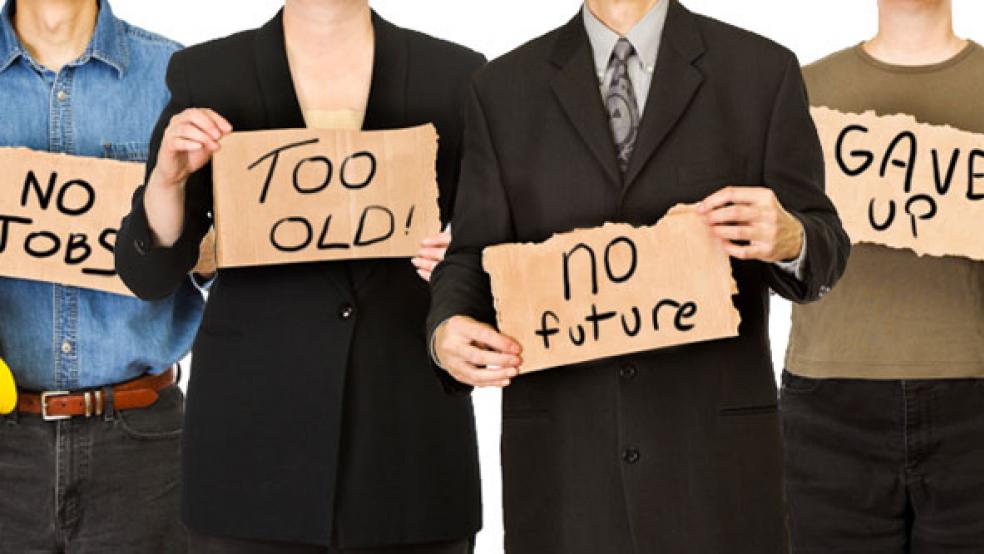Americans remain deeply pessimistic about the nation’s economic future nearly four years into the recovery, and the vast majority think it will take “many years” for things to return to the way they were before the downturn, according to a poll released Thursday.

The survey by the John J. Heldrich Center for Workforce Development at Rutgers University paints a picture of a nation wounded by the recession in ways that have diminished future expectations.
Nearly one in four respondents said they were laid off at some point during the past four years, and even larger numbers said they had immediate family members or close friends who were thrown out of work.
Many of those who found new jobs were forced to settle for less. Nearly half said they took a step down in status from their previous jobs, while 54 percent said they have had to accept lower pay. Often, the pay cuts were severe. On-third of re-employed workers said they swallowed salary cuts of more than 30 percent, while another third said their pay went down between 11 percent and 20 percent.
RELATED: Economy Suffers First Decline Since Recession Ended
Even though the economy has recovered more than half the 9 million jobs lost during the Great Recession, the survey found that Americans perceive that the economy has descended to a new normal.
Fewer than one in five agree that jobs, careers and employment opportunities will be better for the next generation. Nearly three in five said the ability of young people to afford college — a crucial, if ever more uncertain, factor in upward mobility — is permanently damaged. More than two in five believed workers will never feel as secure in their jobs as they did before the recession. Nearly half said the elderly will have to find part-time work after retiring. And 86 percent of Americans said the availability of good jobs at good pay will never return or will not return for many years.
“We have had many months straight of private-sector job growth. Yet people are stuck with this attitude and perception,” said Carl Van Horn, director of the Heldrich Center. “It speaks to how powerful, widespread and enduring this Great Recession is.”
The survey’s findings in many ways match other measures of the nation’s economic struggles after the worst downturn since the Great Depression. The downturn destroyed nearly 40 percent of Americans’ wealth, according to the Federal Reserve, and pushed the unemployment rate to 10 percent.
RELATED: The State of the Union Speech Obama Should Deliver
Private employers have added new jobs for three years straight, and the unemployment rate is now 7.9 percent. The stock market is back to pre-recession levels, and housing values are beginning to rebound across the country.

Still, significant damage remains — 4.7 million workers have been out of work longer than six months. Meanwhile, the Census Bureau has reported that wages are down, and other researchers have found that a disproportionate number of jobs created in the recovery are at the low end of the wage scale.
The survey found that most Americans are not expecting sharp improvement. More than 61 percent expect their family finances to remain at their current diminished levels, nearly three times the number who think their finances will get back to pre-recession levels.
The survey found that Americans blame factors other than the recession for their economic plight. Seven in 10 said the high jobless rate is partly the result of foreign competition and “cheap labor” abroad. Four in 10 suspected that illegal immigrants have taken jobs away from Americans. Another four in 10 said unemployment remains high because Americans “lack the skills” for jobs that might be available.
The survey found strong support for three policy proposals aimed at improving the nation’s labor market. Eight in 10 wanted the government to award tax credits to employers that hire new workers. Three out of four supported stronger education and job training programs. And three out of five said the government should fund direct job creation programs.
At the same time, however, there was deep skepticism about Washington’s ability to do anything to significantly improve the economy, the survey found.
This piece originally appeared in The Washington Post. Craighill is a pollster for Capital Insight, the independent polling group of Washington Post Media.



